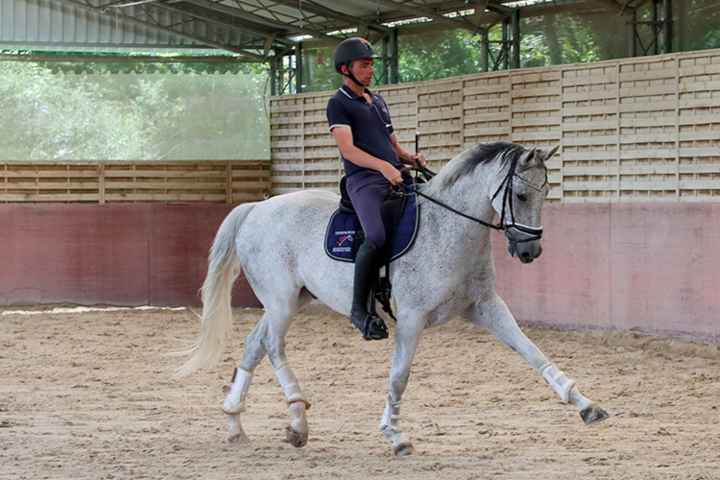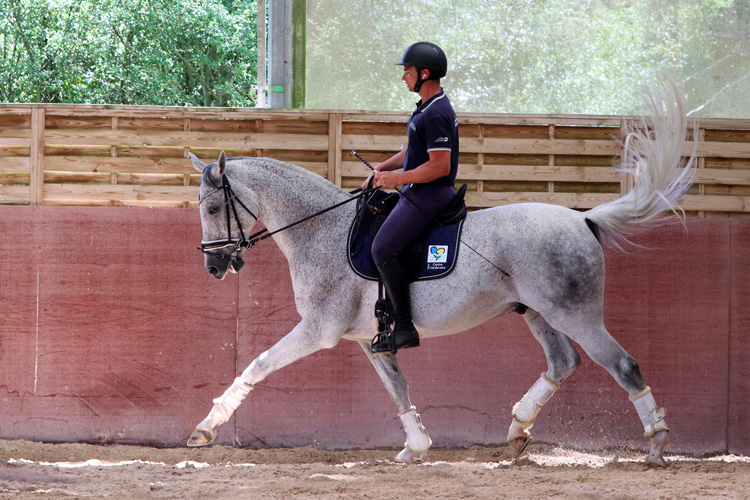
Adib El Sarakby, para-equestrian dressage: “I was virtually born on a horse”
Tuesday, 9 august 2022
Adib, a 41-year-old athlete supported by Banque Populaire Val de France, is an 8-times French para-equestrian dressage champion who aims to do even better! He agreed to answer our questions…
Adib El Sarakby is hemiplegic on his right side following complications at birth and suffers from long-term sequelae. He recently acquired a high-level horse – named Life is good – on which he aims to qualify for the European Championships next year before setting his sights on the major sporting event of the Paralympic Games Paris 2024.
When and how did you start riding?
My mother used to ride and I’d go with her to the stables, where she’d put me on a horse’s back in diapers. I started competing when I was about twelve. I did show jumping at that time and subsequently trained to be an instructor. I completed my work experience in a dressage stable… and that’s how I started this discipline. I competed with able-bodied riders… It was my apprenticeship master who knew about para-dressage and guided me on this path. That’s how everything started for me and I competed in my first French para-equestrian dressage Championships in 2005.
How has sport affected your private life?
In the lead-up to the Paralympic Games Paris 2024, I asked my employer to switch me to part-time work. I have to work to earn money because my sporting passion doesn’t allow me to pay the bills. I’m a receptionist for a large luxury cosmetics company. So this sporting project has had a direct impact on my personal life.
How did you make the transition to the top level?
I was selected for the French national team for the first time to compete in the World Championships in 2007. I’d already taken part in my first French championships in 2005 at the age of 24. You can become an athlete quite late in horse-riding… At that time in France, it was known as équitation handisport (‘disabled horse-riding’); now it’s called para-equestrian dressage.
What is your most important sporting memory?
It’s something unusual because my most outstanding memory is a comment made by someone I didn’t know that I met at a party. She asked me why I was putting myself in danger to practice a sport. For her, there was no place for a disabled person in a sports arena.
I realized, from the way she said it, that she was afraid for me; she wasn’t necessarily expressing intolerance but more her ignorance… But I was struck by this question, and it merely strengthened my commitment. What’s more, I invited her to come and watch a training session one day, and she was amazed to see what disabled athletes were capable of doing…
Which male or female champion do you admire the most?
For me, it’s Teddy Riner. He’s excellent in his performance, in his judo and in the way he has of being with people… He’s built up a team around him…. This is how I see elite sport: the duty to set an example, to represent a nation… to be as positive as possible…
What do you like about your discipline and why is it so special?
Our discipline is considered an individual sport. I try to show when I visit schools in my part of France that this isn’t true because, in fact, we have a partner – the horse – which plays an essential role in our preparation. The rider/horse relationship is of fundamental importance; we form a pair. We’re responsible for the animal and its well-being: the quality of the performance depends to a great extent on the quality of this bond.
This is all the more true in para-equestrian dressage where the horse has to demonstrate a special ability to adapt to the rider’s disability… Not all horses are able to accept this disability…
What do you think about when you doubt your abilities?
This is a sport where we call ourselves into question every day. Firstly, it’s because we work with an animal that, like us, feels fine one day and not so fine another day. It’s up to us to reassure the horse, to support it… because you can’t force a horse weighing 600 kilos! It’s a relationship founded on trust. We’re not riding a bicycle but a living creature, which is something that makes this sport so magic. The horse plays an integral part in our performance, which inspires a lot of humility in the rider. All the more so as in para-equestrian dressage, we only have enough money to finance one horse, so the horse really becomes our baby…
What is your key strength?
My principal strength is my sensitivity but it’s also my principal weakness…
What is a typical day for you?
My typical day is extremely monotonous: I train from Monday to Sunday; I work from 8am to 12pm, then I go home. I live in the countryside near Orleans in central France. I put on a pair of shorts and a pair of sneakers… and I leave for 45 minutes of cardio training or muscle strengthening. At 1:30 pm I have lunch. It’s something pretty light, usually a salad. I then allow myself a 30-minute break when I try to clear my head… Then at around 2:30 pm I go to my training center. It takes half an hour to drive there. I meet up with my coaches (equestrian coach: Elodie Lambolez, mental coach: Guillaume Leroy) and my horse… We work for an hour and a half… From 4:30pm to 5:30pm we hold a debriefing session and I take care of the horse… After that, I go to the local swimming pool. I arrive there around 6pm. I swim for an hour and I finally get back home at 8pm. That makes a long day! It’s my typical schedule from Monday to Friday. On Saturdays, I don’t go to work but I do the same thing without the swimming, and on Sundays I don’t do the riding session.
How do you see yourself in twenty years?
I would like to pass on what I’ve learned. It’s vital for me, personally, to share my knowledge with young athletes…

What do the Paralympic Games Paris 2024 represent for your career?
It’s going to be something magical… I can’t define it because I’m still focused on my performance and my day-to-day work to remain tethered to reality… The first goal is to qualify for the Games, we’ll see about the medals afterwards… But I know it’s going to be something magical!
How does an athlete prepare for the Paralympic Games? Is it really a special event compared to other competitions?
Absolutely. I’ve become more professional as I prepare specifically for these Games. I wouldn’t be following this schedule if I weren’t preparing for Paris 2024… Right now, we’re both close to, and yet far from, our goal. We can already feel the magic and we’re impatient, but we still have two years to go!
We’re working twice as much as normal. It’s going to be something crazy, grandiose! I’m making sacrifices that I wouldn’t be making if it weren’t for the Games. Actually, ‘sacrifice’ isn’t the right word… My horse also senses that there’s something special in the offing because he has a special team of professionals working on him; he has a horse masseur, a horse osteopath, one of the best national veterinarians… On the other hand, we haven’t changed his daily routines…
If you had to identify a single value your admire in sport?
Sharing and exchange…
Do you have another passion in life?
I have a wonderful wife; she’s my other passion!
How important is the support of your partner, Banque Populaire Val de France, in your life as an elite sportsman?
In fact, I was already immersed in the Banque Populaire universe because I was lucky enough to have been selected and accompanied by the Banque Populaire Foundation within the framework of its support program for people with disabilities pursuing high-level sports projects.
And from now on, I’m already very proud to be representing my sponsor Banque Populaire Val de France, to embody its values through my sport discipline, para-equestrian dressage, and high-level sport in general.
This allows me to become professional in an amateur sport. Thanks to this support, I’m able to live my sport to the full in the hope of putting up a good performance. It wouldn’t be possible otherwise, all the more so as equestrian sports cost a lot of money… If or when my partners let me go, everything will come to an end.
The goal, however, remains being chosen for the French national team with, if possible, one or more medals at the Paralympic Games Paris 2024.